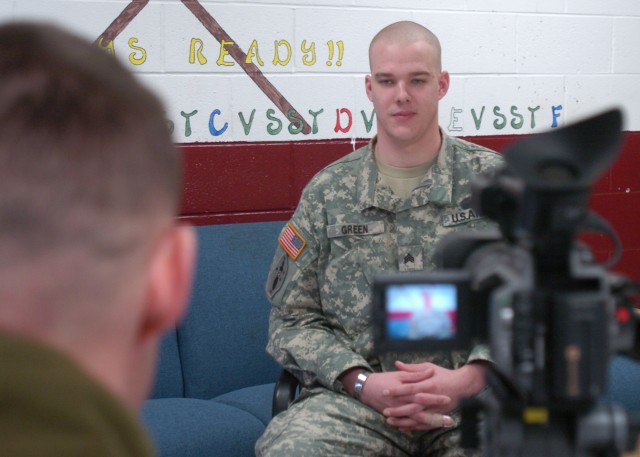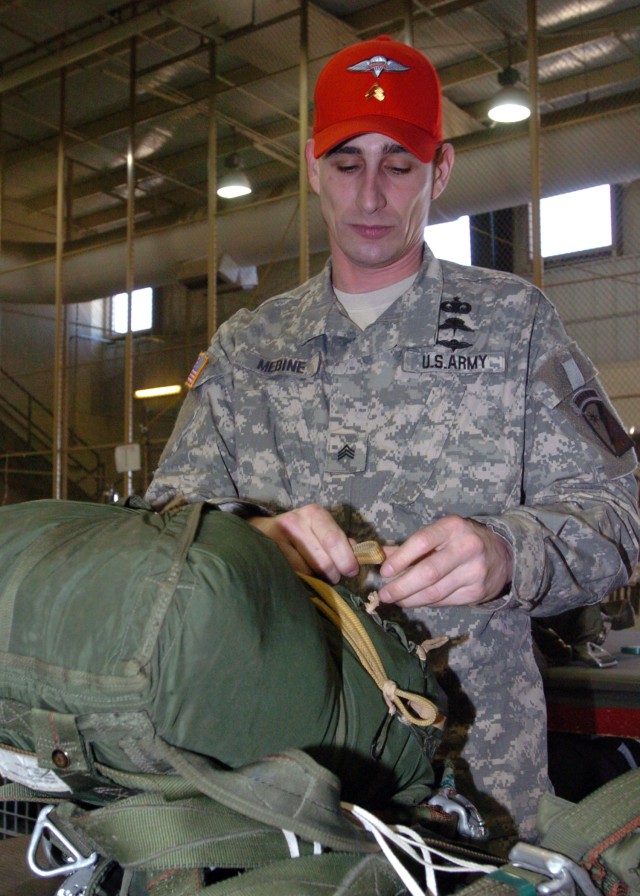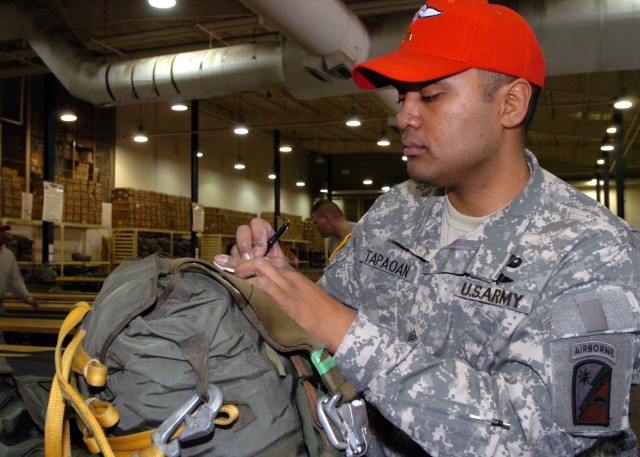In their words: NCO stories
Serving his service
Sergeant Orlando Serna, a food service specialist with the 407th Brigade Support Battalion, and pastries chef for the field team, pours a mixture of peaches and blueberries into a cup for his peach and blueberry cobbler dessert.
The U.S. Army Culinary Arts Competition, the largest competition of its kind in the United States, has several categories in which teams and individuals can participate, including hot food cooking, patisserie, a team buffet, showpieces and many more.
Keeping quality high
Sergeant 1st Class Jerry Hill, the dining facility manager with Headquarters and Headquarters Company, 82nd Cavalry, inspects the overall quality of a dessert and offers suggestions on enhancing the overall garnishing.
"I am in charge of quality control and making sure the food is prepared properly," said Hill. "We want to give the Soldiers more bang for their buck."
To Hill, being a noncommissioned officer is an all-encompassing job.
"It is my job to lead and train my Soldiers," said Hill. "My favorite part of this job is being with Soldiers, and I want to make sure leadership skills are instilled in them to prepare them for the future."
Hill has been an NCO for 11 of his 18 years in the Army.
Mentoring the troops
Master Sgt. Eric R. McCray, operations sergeant major, 1st Battalion, 7th Air Defense Artillery, loves being part of an organization that takes care of America's most precious resource.
McCray, who has been an NCO for 16 years, believes "the most important aspect of my job is to teach, coach and mentor our leaders of tomorrow and provide them with the drive to meet any mission they are called to carry out."
Leading from the front
Command Sgt. Maj. Richard S. Clem, 108th Air Defense Artillery Brigade Command, runs at the head of the formation during a brigade run Feb. 6, 2008. Clem, who has been an NCO for 20 years, compares being an NCO to being a superhero. "You come into work every day with the ability to influence change in Soldiers and families."
Taking care of the 'family'
Sergeant 1st Class Jason Bauerkemper, a wheeled-vehicle maintainer, Headquarters and Headquarters Battalion, 108th Air Defense Artillery, calls cadence during a brigade run, Feb. 6, 2008.
Bauerkemper, who has been an NCO for six years, enjoys the interaction with his troops; teaching them about maintenance and how to be great Soldiers.
"(NCOs) are the ones that ensure completion of the mission and the health and welfare of our troops and their families," said Bauerkemper.
Setting a good example
Sergeant Samuel A. Green, supply sergeant, 36th Area Support Medical Command, practices an on-camera interview during a media-training exercise.
Green, who has been an NCO for one year, loves ensuring Soldiers have what they need in order to accomplish their missions.
"To me, being an NCO means setting the example while preparing young Soldiers to be NCOs themselves," he said.
Experience matters
"There's lessons learned in your younger years as a Soldier that are just invaluable when you get to my level," said 1st Lt. Dennis Chamberlain, a former sergeant, with Headquarters and Headquarters Company, 1-158th Infantry Regiment, Arizona National Guard. "In the future, if I get a company or a battalion command, it's going to be all those lessons I learned as a young private and sergeant that are going to pay dividends to me. I wouldn't have known what to do if I was a brand-new second lieutenant thrown into a combat situation.
"That's where your NCO Corps pretty much trains your Officer Corps, is in those first couple years. That was something my NCOs didn't have to do. We were able to jump in and start functioning because I was already at a level to operate. Without a doubt, I think it generates a more quality officer. Not necessarily a better officer, but for those first couple years, they have more of a knowledge base to make decisions on. The more knowledge you have, the better decisions you'll make."
Looking out for their welfare
Sergeant John Mebine, a squad leader and rigger with 11th Quartermaster Company, ties a static line to a parachute.
Mebine says that as a rigger, safety is his primary concern. "It is important to make sure the parachutes are packed right," explained Mebine. "I keep in mind that every chute that is packed could be the one that I have to jump."
Mebine has been an NCO for two of his seven years of service.
Achieving goals
Sergeant Gregory Hublitz, a packing and processing inspector with 11th Quartermaster Company, finishes packing a parachute and signs the log book to verify the parachute was properly packed.
Hublitz has been an NCO for a little more than a year and says seeing Soldiers achieve their goals is his greatest motivation.
"Mentoring is my favorite part of the job," he said. "Seeing my Soldiers grow, progress and achieve their goals is a great feeling. The Army is what you make of it, it really is. Anything is possible if you set your mind to it."
Ensuring quality
Sergeant Oscar Rivera, a squad leader and inspector with 11th Quartermaster Company, looks up at a rigger during one of the packing inspection check points.
Rivera, who has been in the Army for 12 years, six as an NCO, says inspecting every part of the chute is crucial for the safety of the Soldier.
"Attention to details and quality control are important when preparing chutes," he said. "During inspection I look at the static line and feel it to check for any fraying. I make sure the lines are straight and that the pack tray is put on correctly. I also watch the Soldiers as they are packing their chutes, checking for quality control."
Passing on knowledge
Sergeant Jason Tapaoan, a squad leader and rigger with 11th Quartermaster Company, signs the parachute log record book, after inspecting the parachute for deficiencies.
Tapaoan, an NCO of two years, enjoys caring for his Soldiers and helping them reach their potential.
"Taking care of Soldiers and passing on the knowledge you have gained from your own previous NCOs is great," said Tapaoan. "It is most rewarding being able to watch your Soldiers get promotions or rewards, knowing that you had a part in (their) professional development."






















Social Sharing